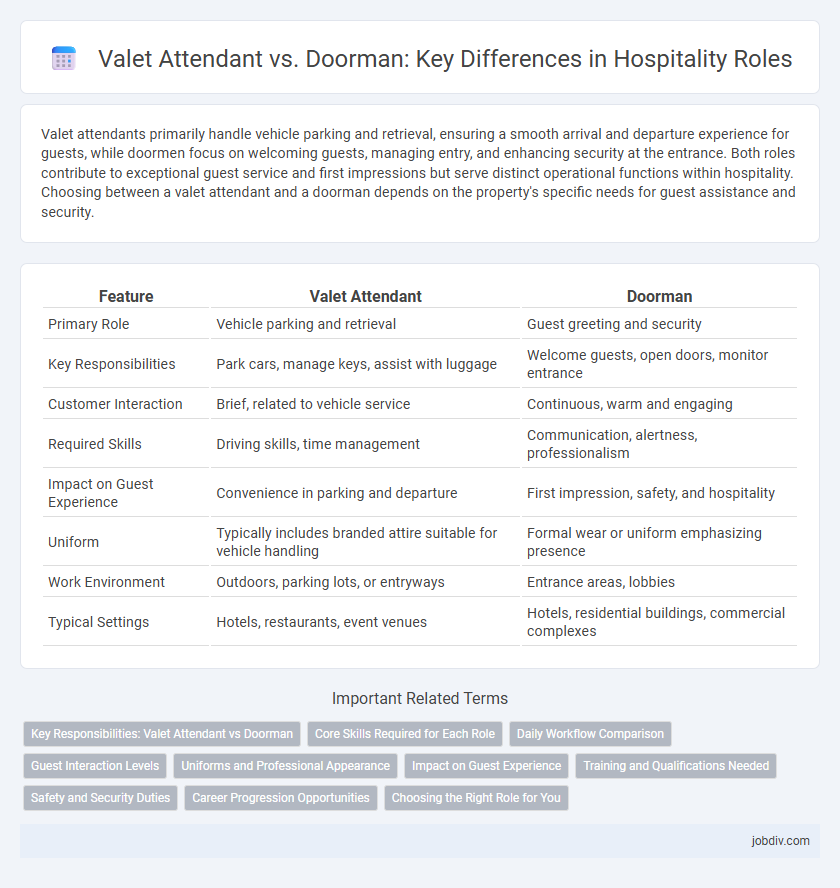Valet attendants primarily handle vehicle parking and retrieval, ensuring a smooth arrival and departure experience for guests, while doormen focus on welcoming guests, managing entry, and enhancing security at the entrance. Both roles contribute to exceptional guest service and first impressions but serve distinct operational functions within hospitality. Choosing between a valet attendant and a doorman depends on the property's specific needs for guest assistance and security.
Table of Comparison
| Feature | Valet Attendant | Doorman |
|---|---|---|
| Primary Role | Vehicle parking and retrieval | Guest greeting and security |
| Key Responsibilities | Park cars, manage keys, assist with luggage | Welcome guests, open doors, monitor entrance |
| Customer Interaction | Brief, related to vehicle service | Continuous, warm and engaging |
| Required Skills | Driving skills, time management | Communication, alertness, professionalism |
| Impact on Guest Experience | Convenience in parking and departure | First impression, safety, and hospitality |
| Uniform | Typically includes branded attire suitable for vehicle handling | Formal wear or uniform emphasizing presence |
| Work Environment | Outdoors, parking lots, or entryways | Entrance areas, lobbies |
| Typical Settings | Hotels, restaurants, event venues | Hotels, residential buildings, commercial complexes |
Key Responsibilities: Valet Attendant vs Doorman
Valet attendants specialize in parking and retrieving guests' vehicles efficiently, ensuring prompt and secure handling while maintaining keys and coordinating with service teams. Doormen primarily focus on welcoming guests, managing entry and exit points, assisting with luggage, and providing security by monitoring access to the property. Both roles enhance guest experience but differ in their core responsibilities, with valet attendants centered on vehicle services and doormen emphasizing guest reception and safety.
Core Skills Required for Each Role
Valet attendants require excellent driving skills, time management, and the ability to handle vehicles safely and efficiently under pressure. Doormen must possess strong interpersonal communication, alertness for security, and a polished appearance to provide a warm and professional first impression. Both roles demand customer service expertise, but valet attendants focus more on operational precision while doormen emphasize guest interaction and safety.
Daily Workflow Comparison
Valet attendants primarily manage vehicle parking and retrieval, ensuring efficient traffic flow and guest convenience during peak hours with tasks like key handling and coordinating with security. Doormen focus on guest reception, opening doors, assisting with luggage, and monitoring building access to maintain safety and provide a welcoming environment. Both roles require strong customer service skills, but valet attendants emphasize logistical coordination, while doormen prioritize guest interaction and security presence.
Guest Interaction Levels
Valet attendants engage with guests primarily during vehicle drop-off and pick-up, providing personalized assistance that ensures a smooth transition to and from the property. Doormen maintain a continuous presence at the entrance, offering greeting services, door handling, and assistance with luggage, fostering an immediate and welcoming atmosphere. Both roles enhance guest experience but differ in interaction frequency and context, with doormen facilitating ongoing entryway engagement and valet attendants delivering targeted, service-oriented contact.
Uniforms and Professional Appearance
Valet attendants typically wear tailored uniforms that include branded shirts or jackets with name tags, emphasizing functionality and easy identification. Doormen often sport formal attire such as tailored suits, overcoats, and polished shoes, projecting elegance and authority at the entrance. Both roles require impeccable grooming and well-maintained uniforms to reinforce a professional image and enhance guest experience.
Impact on Guest Experience
Valet attendants enhance guest experience by providing seamless curbside parking, ensuring convenience and timely vehicle access that fosters a sense of personalized service. Doormen contribute to guest satisfaction by offering a warm welcome, assisting with luggage, and maintaining security, which creates a safe and inviting atmosphere from the moment of arrival. Both roles complement each other by combining efficiency and hospitality, significantly elevating overall guest impressions at hotels and luxury residences.
Training and Qualifications Needed
Valet attendants require training in vehicle handling, safety protocols, and customer service, often obtaining certifications such as defensive driving or valet safety courses. Doormen need skills in security awareness, crowd management, and hospitality etiquette, with qualifications including first aid training and familiarity with emergency procedures. Both roles demand excellent communication abilities and a strong emphasis on providing a positive guest experience.
Safety and Security Duties
Valet attendants primarily ensure vehicle safety by securely parking and retrieving cars, closely monitoring key control and access to prevent theft or damage. Doormen focus on building security by managing entrance access, screening visitors, and observing suspicious activity to protect guests and property. Both roles contribute to safety but differ in scope, with valet attendants emphasizing vehicle protection and doormen specializing in controlled access and surveillance.
Career Progression Opportunities
Valet attendants often advance to supervisory roles or management positions within parking and guest services departments, gaining skills in logistics and customer interaction. Doormen typically progress to concierge or front office management roles, leveraging their expertise in guest relations and property security. Both paths offer strong career growth by developing essential hospitality skills, but doormen generally access broader opportunities in guest services and facility operations.
Choosing the Right Role for You
Choosing between a valet attendant and a doorman depends on your preference for hands-on vehicle management versus guest greeting and security duties. Valet attendants require strong driving skills and attention to vehicle care, while doormen excel in customer service, safety, and managing building access. Assess your strengths in physical tasks or interpersonal interaction to select the hospitality role that best matches your capabilities and career goals.
Valet Attendant vs Doorman Infographic

 jobdiv.com
jobdiv.com